Buck Mulligan (Telemachus opening)
This text was created mostly under Don Gifford's glossary explanations and a context was provided to make sense.
Stephen Dedalus is living temporarily in a Martello tower on the beach at Sandycove and he feels that his friends are willing to expel him out, what he does not intending to return. Buck Mulligan is a medical student who lives with him, or with whom he lives together, and at this early stage of the beginning of the day, he mimics a priest approaching the altar, singing the introito and lifting the shaving brush in a bowl in a parody like of the chalice in the Catholic Mass
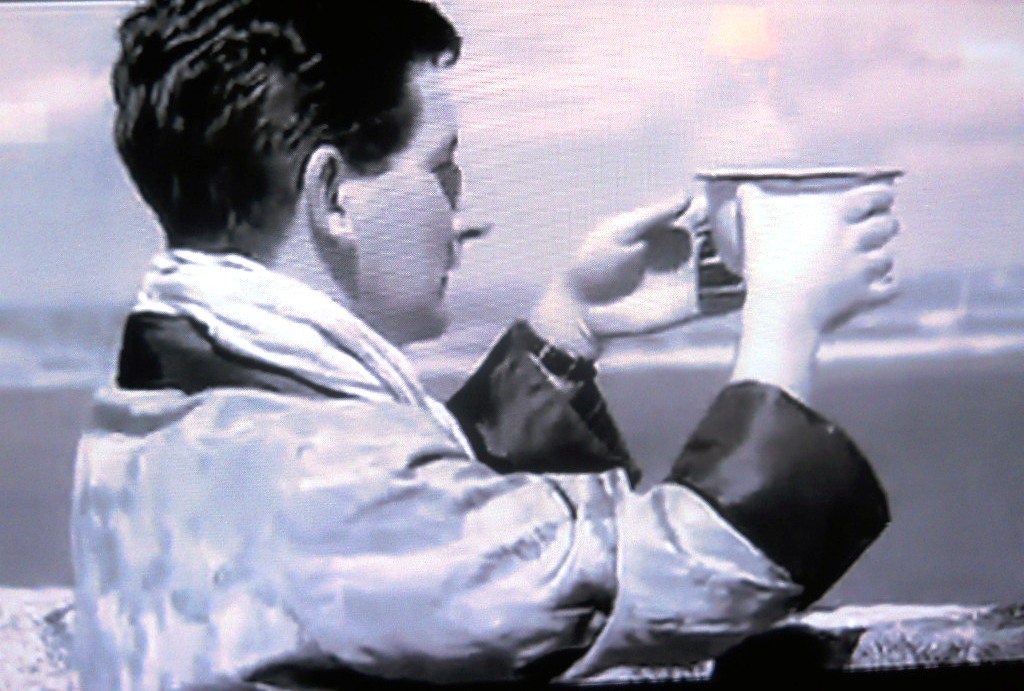
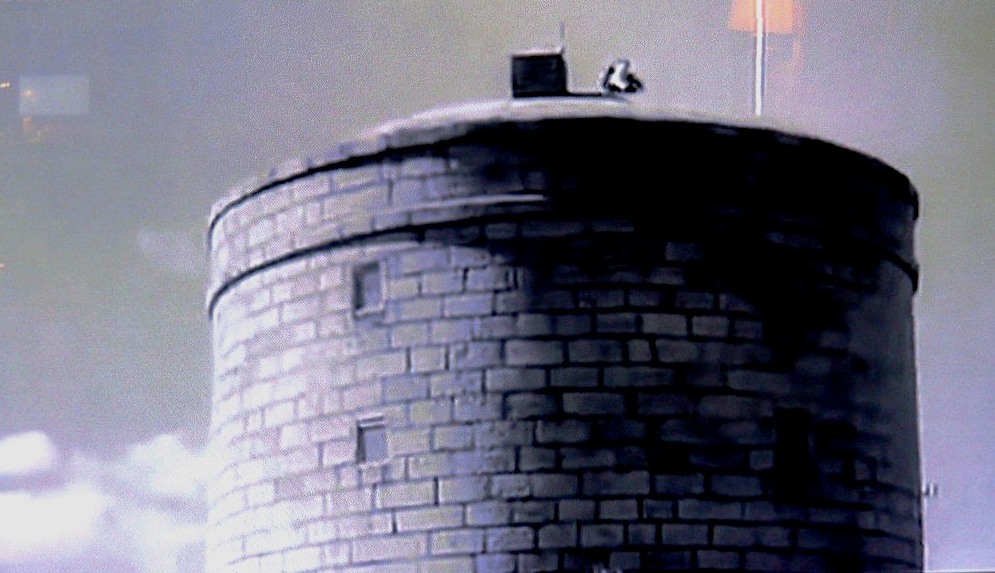
Above picture of the Martelo Tower and bellow Sandycove, near Dublin, where they are located. On the right the real Buck Mulligan, Oliver St. John Gogarty. On the left, above, TPMckenna, in the the movie of Joseph Strick, 1967
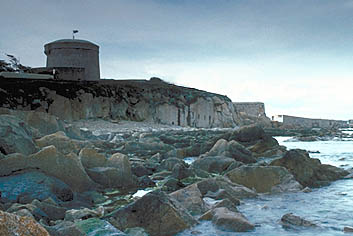
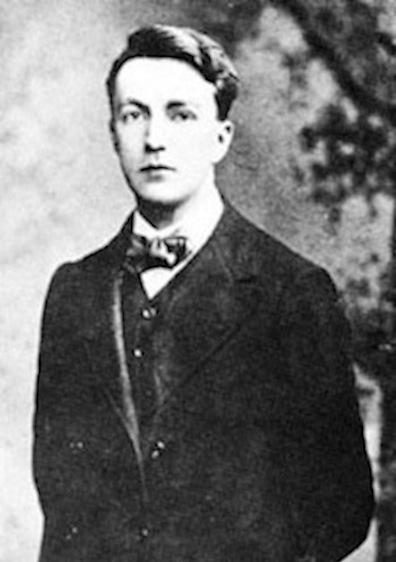
Climbing up the stairs leading up to to the top, Stephen Dedalus is considering the scene described, loaded with symbolism, which can be summarized the following way:
bearing
Instead of carrying, to indicate solemn gesture, a typically Joyce's trick cf.Senn, Fritz, Joyce's dislocutions. Essays on Reading as Translation, p 33
bowl of lather on which a mirror and a razor lay crossed
a shaving bowl, over which are crossed a mirror and a razor
The fact that the mirror and razor are "crossed" obliquely announces that soon Mulligan will parody a Catholic priest celebrating Mass. But these two objects also obliquely placed indicating tensions in the relationship between Mulligan and Stephen Dedalus - tensions that arise in a very concrete way with the physical experience of seeing oneself as an object (the mirror) and the threat of injury (razor)
Introibo ad altare Dei
The first words of Mulligan stard a mocking parody of the Catholic mass, although, in retrospect, the stage has been set for his "impressive" appearance (Stately) carrying a bowl in which a mirror and a razor are "Crusaders." In its simulated ritual the shaving basin is the cup (or ciborium or pyx) which keeps the wine that will become changed into the blood of Christ. The Latin phrase means "I go up to the altar of God."
Mulligan makes the offering to imagine a congregation of "body and soul and blood and wounds" (body and soul and blood and ouns) as if Christ was Christina, that is, a woman, which refers to Satanic Masses which were celebrated over a naked woman's body.
In the mass, this part of the celebration is a repetition of the Last Supper:
"Taking the cup, and giving thanks, he gave it to them and said, 'Take this and divide it among yourselves (...) then took the bread, and when he had given thanks, broke it and gave it to them, saying, 'Drink from it, all of you; for this is my blood of the covenant, which is poured out for many for the forgiveness of sins.
The intention is not to celebrate but make Christ present, living once again.
The Mass here is the "ordinary" in Latin, prior to 1962, when Latin was left out..
The yellow color of the robe, because it is untied (ungirdled) indicate heresy.
Equine face& pale oak hair - Suggests the Trojan Horse, betrayal.
This opening has to be contextualized within the Symmetry of Homer's Ulysses and I quote what has already been explained there:
The narrative structure that Homer used to tell his tale can be jarring if you are unprepared. The story of Odysseus would have been well-known by the time Homer crafted his definitive version, so he plunges in, fully expecting that the audience is already familiar with the hero. As with The Illiad, he begins by invoking the muse:
Sing to me of the man,
Muse, the man of twists and turns
driven time and again off course, once he had plundered
the hallowed heights of Troy.
Many cities of men he saw and learned their minds,
many pains he suffered, heartsick on the open sea,
fighting to save his life and bring his comrades home.
But he could not save them from disaster, hard as he strove –
the recklessness of their own ways destroyed them all,
the blind fools, they devoured the cattle of the Sun
and the Sungod wiped from sight the day of their return.
Launch out on his story, Muse, daughter of Zeus,
start from where you will – sing for our time too.
The adventure with the Cattle of the Sun is near the end of Odysseus’ suffering abroad, yet it is one of the first things Homer tells us. It is a narrative technique called in medias res, which means to begin “in the middle of things.” As a result, the majority of Odysseus’ most famous adventures are told in a flashback sequence that spans four lengthy chapters. We also bounce between what it happening with Odysseus abroad and what is occurring with his wife Penelope and son Telemachus back in Ithaca. Additionally, there are a few abrupt transitions to the gods conversing on Olympus. If you feel lost at any point while you read, SparkNotes has an excellent breakdown of the book that you can view for free on their website.
As Prof. Don Gifford explains to us, the book I of Homer's Odyssey opens with the invocation of the muse (above, with explanation that Gifford does not provide and which is timely, especially for the symmetry we want) followed by an account of how the council of gods in the Olympus, chaired by Zeus, decides it's time for Odysseus to return home. The scene then changes to Ithaca where we found Telemachus, son of Odysseus, "one boy dreaming with the return of his father," in Fitzgerald's words. The boy is angry and unhappy, threatened with treason and loss of position by suitors surrounding his mother, Penelope, during the absence of his father. These arrogant men are led by Antinous and Eurymachos. Telemachus seeks counsel of the gods and Pallas Athens is revealed to him as his protector. She advises him to travel in search of his father.
The interactions occurring in Joyce's Ulysses, this first chapter, follow the same sequence, which will gradually falling into place before they become clear as you can see below in the Final Interpretation and what goes on in our mind is more or less the following:
The episode opens with Buck mocking the actions of a priest at mass, an affront to the previously devout Dedalus, and an image that highlights Buck’s disrespectful and boisterous nature. Buck calls Stephen a “fearful Jesuit” and pokes fun at the Greek origin of his last name, calling it “absurd.” Buck nicknames Stephen “Kinch,” meaning knife-blade, which opposes Buck’s own “stately, plump and “ungirdled” appearance. Buck’s loud and theatrical gestures as he mimics the priest contrast with Stephen’s slow, weary, and quiet ones. Buck’s “light” appearance—he is wearing a yellow robe, is covered in white shaving cream, has “white teeth glistening here and there with gold points,” and has “light untonsured hair, grained and hued like pale oak” underscores Stephen’s dark, somber appearance. Buck mocks Stephen for wearing second-hand clothing, for continuing to wear only black as he mourns his mother’s death, and for his infrequent bathing patterns. The physical contrasts between the two further highlight the alienation and sobriety that define Stephen.
After Buck concludes his performance of the mass, Stephen asks how much longer the Englishman Haines will be staying with them in the tower. The presence of Haines immediately brings forward the tension between English and Irish identities—wherever Stephen goes he cannot escape the haunting force of the Englishman. Buck backhandedly criticizes Stephen by telling him that Haines thinks that he is not a gentleman. Stephen worries about the violent nature of Haines, who screamed about a black panther in the middle of the previous night. “You saved men from drowning. I’m not a hero, however, if he stays on here I am off,” Stephen tells Buck. Haines poses an even greater threat to Stephen, the artist, than to Buck, the strong and “heroic” doctor.
Buck, Haines, and Dedalus exit the castle and walk along the water. Buck continues his theatrical gestures as he taunts Stephen and chants a song, “the ballad of joking Jesus,” before he walks ahead. Stephen and Haines are left to one another and engage in a calm conversation. Stephen accepts a cigarette from Haines, a friendly, accepting gesture, even though the cigarette case, silver with an emerald is a symbol of the small gem that Ireland is to the dominant England, as pointed out by Blamires (p.7). Stephen realizes that the “the cold gaze which had measured him was not all unkind” and he discusses the servitude he feels to his English and Italian masters and eventually to the “imperial British state and the holy Roman catholic and apostolic church.” Haines is understanding of Stephen and concludes, “it seems history is to blame.” Haines’s statement cements the English dominance Stephen experiences and separates Haines, though he is an Englishman, from the damage that has been done.
Haines and Dedalus catch up to Buck who undresses and gets into the water. Haines says he will wait to go in. Buck demands that Stephen give him the key to the tower. He also demands an extra two-pence from Stephen. Stephen places the key and money on Buck’s clothing and begins to walk away. Buck tells Stephen to meet them at “The Ship” at noon for lunch. Stephen, however, has already decided that he will not sleep in the tower that night. His statement “Home also I cannot go,” underscores the sense of lostness and aloneness that fills him. Stephen has no true home to return to. Buck has taken away Stephen’s final scraps of a home life. Buck has seized Stephen’s physical belongings: his handkerchief, his money, his space in the house through Haines’s presence, and finally his key. His disrespectful nature and the abrasive, intrusive way with which he interacts with Stephen forces Stephen to face himself and the actions that haunt him. Through Buck’s usurpation, Stephen must leave the tower and face the world outside.
A modern contextualization comparing with the functioning of a computer
When we turn on a computer, to start its operation, this is done by making use of a way to initially access what is inside of the compter and it is called "bootstrap". It is a metaphor comparing when as if we were to use a boot to walk, to wear it and to be able to walk as we do initially. Typically the "bootloader" loads the main operating system so your computer is able to work. The function of the bootloader is to load other data and programs that will then be executed. It's that initial timing you expect the machine to get ready so you can use it
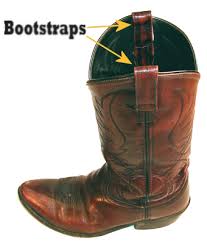
Chapter I of Ulysses is the boot strap Joyce uses to access other information, logic, understandings, scenarios, contexts, everything he selected to pass to the readers and what he thinks about all that he is "strapping" and putting before us. In addition to Homer, he wants to connect also with his book Portrait of the Artist as a Young Man with Ulysses, which he is opening. He also questions his origin, both personally and of the group which originated him, the Irish. In fact, he mixes these two things. It is very important to realize that because it is al launched as a kind of "framework" or reference scheme. He does not go by nationalism, because he does ot trust it including its Gaelic aspects. There is nothing such as "back to the origins ". The origin is here and now, and it is Europe what he found in France, Italy, which he wants to level with the same status
Joyce's operating system it is the Ulysses of Homer. What he wants "to strap" is described in the table above, neatly and separated within an operating logic we perceive, aided by an analysis with semiotic criteria of Gilbert, Gifford, Blamires and others.
This idea is confirmed by Stuart Gilbert, pg 3, Ulysses a study: "The first parte (three episodes) serves as prelude to the narrative of Mr.Bloom's day, the main theme, and may be regarded as a 'bridge work' between the author's earlier work, the Portrait of the Artist as a Young Man and Ulysses."
The chapter opens up with a mockery of the Mass by Buck Mulligan. In terms of Homer, Mulligan is Antinous, leader of the treacherous suitors and he, along with English Haines, will take possession of Tower Key, symbol of their "home", which in English can mean residence, maternal nest, family, land , country, habitat, everything that combines the origin of Dedalus. In his novel "A Portrait of the Artist as a Young Man," Joyce closes it when he is sent for France, the country where he had driven in search of freedom, and this opening scene of Ulysses, the discussion about her mother's death indicates that he is returning home. His refusal to pray in his mother's deathbed will chase him with a sense of guilt that will permeate throughout the book. Stephen, as Telemachus and Hamlet, is looking for a father. Not the biological father, for indeed he has Simon as father and who he really lost was his mother, indicating that he misses a spiritual father. This father - spiritual "mother" as it will be called in SCYLLAand CHARYBDIS,"a mystical estate mystical", being that mystical has the same root in Latin and it is obvious, but "estate" means homestead, property, goods, social class, time period. For example, low estate means humble. High estate, high social status. Tale a look at estates of the realm in Wikipedia.
The name Daedalus also "branch and link", and there is no satisfactory translation to define this operation, with another pair of son and father, Daedalus and his son Icarus. Daedalus built the labyrinth where the Minotaur lived. This story is wonderful and has such a range that the flight of Daedalus and his son Icarus by the invention of wing to fly away and the disobedience that takes him close to the sun, melting it and knocking him down, has dismemberment that can connect to the origin of Eros and Psyche, in which a similar metaphor is created. Joyce wants to get away from the connection he has with the UK and hover above his Jewish lineage, along with his Irish race above all and together with other European races, since the mythical back ground is the same as Europe

O símbolo "heir" - herdeiro e a última palavra do episódio ("Usurpador") levanta questões de paternidade e herança (criativa, espiritual, mítica) que irá ecoar através do livro. Também levanta o tema de expropriação. Podemos ligar isto com a tomada da chave por Mulligan, ou as roupas de sacerdote (padre) que Stephen acabou de perceber, simbolizando a Igreja, que como o Estado, é um símbolo de poder, hipocrisia e imposição para Stephen ("I am a servant of two masters... an English and an Italian" - sou servo de dois senhores... um Inglês e um Italiano), referindo-se ao colonialismo Inglês e ao catolicismo romano. Estas duas forças exploraram a Irlanda e a deixaram como "old shrunken paps" velhas tetas encolhidas. A palavra "paps", claro, inicialmente significa fonte de leite materno de uma mulher. Mas "paps" também tem a definição adicional de "idéias inúteis ou simplistas" - significam que os irlandeses mexiam com querelas inúteis, mesquinhas e ambições rasas. O "old" indicava que os irlandeses faziam isto há séculos e indica também exaustão.
Apesar de toda a densidade de alusões culturais e literárias e o fato de que a narrativa confunda um pouco a possibilidade de distinguir se a linguagem é "voz interna" ou explicita e pareça muito estar ordenada através de dispositivos associados com monólogo interno, o estilo do episódio é bem convencional, como se fosse uma continuação do Retrato do Artista Quando Jovem. Joyce o fez bem intencionalmente, pois definiu isto como "estilo inicial" e assim se referiu numa carta a Harriet Shaw Wever:
"I understand that you may begin to regard the various styles of the episodes with dismay and prefer the initial style much as the wanderer did who longed for the rock of Ithaca. But in the compass of one day to compress all these wanderings and clothe them in the form of this day is for me possible only by such variation which, I beg you to believe, is not capricious". (Letters, 6 August, 1919)